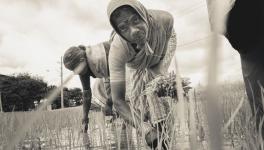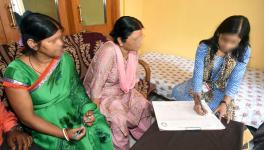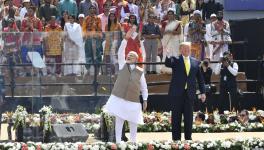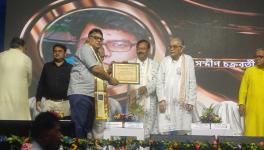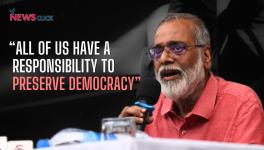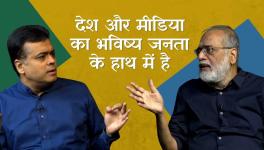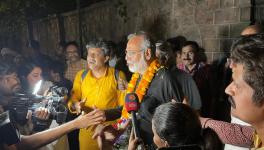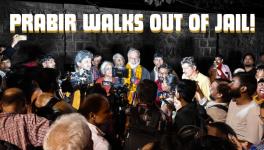Biometrics, Turning a 'Citizen' into a 'Subject': Usha Ramanathan
In the wake of controversies concerning the NATGRID and UID project involving collection of biometric data of the Indian population, noted law researcher Usha Ramanathan speaks to Newsclick about the politics behind this move. This is Part I of the two-part interview.
Rough Transcript
Jyotsna Singh (JS): Hello and welcome to Newsclick. The national population register of Census 2011 is not going to collect only the basic information about the citizen's of the country the way it was done till 2011. but it is also going to collect the biometric data of the population. Biometrics is essentially an identification of an individual on the basis of his or her unique human characteristics. For e.g. facial recognition, finger prints, iris patterns etc. There is a lot of debate going on among the intellectuals within the people who are related to law etc. To understand the nuances within this,today I have with me eminent law researcher and activist Usha Ramanathan to talk to us the implications of biometrics and individual profiling of the population of a country. Welcome to our show. Biometrics has been used for a long time in forensic sciences, banking and lot of other purposes. How the implication has now been changed when you have been talking about public policy and when it gets related to UID.
Usha Ramanathan (UR): to say while I am answering your question I think it is important to recognise that the national population policy register and the census are actually two completely different exercises. What is being done is to use the opportunity of the census to see if it is possible to load the exercise of the national population register on the census exercise that's all. Now the census has been there you know for over a century. The idea being that it should be possible for us to understand composition of a population and it's requirement so that state can figure out how it needs to function. The national population register has a completely different take. There is one fundamental difference between these two that we need to understand that the census is confidential whereas the national population register very clearly is not. So when you ask about biometrics. The fact that the biometrics is through registered exercise is significant also because it means that information can be widely used, it can be handed over to different agencies. There is no sanctity in the NPR collecting the biometrics because in fact the intention is that the idea was to link up NPT with the UID exercise so that they can hand the information that they collect as a protocol to the UID to be able to deliver numbers. So, that's an important distinction that we need to understand. I think one of the ironies of the situation is that when you look at the constitution of India. The constitution of India sees us as the citizens, doesn't see as the subjects and as citizens we are entitled certain rights. So you find that if a person is accused of an offence, they have a right to silence. They also have a right to the bodily integrity. So to tell people that you have to part with information with yourself to a law enforcing agency, there are limits to that are placed by the constitution. It is almost as if government today believes that is only for a people who are accused of crimes but the ordinary citizen doesn't have any of these protections. Today, we are being asked to divulge all manner of information about ourselves and it's being converted into a coercive exercise where biometrics have to be given and government in it's various databases and private agencies in various databases will be holding on to information about us which includes biometrics. There is one challenge that I want to make to the statement that you have made which I know which you are saying but being said is that biometrics are unique. I don't know there is anything to guarantee to us that it is because what we heard for instance, the fingerprints, the maximum number of people over whom it has gone is taken is only fifteen million people and that's even by the biometrics committee itself says about the UIDI, which is trying to push biometrics. I think it's important to place biometrics into context. Biometrics is basically using body as a marker. There is various ways in which this is being done like you said there is facial recognition technique,there is iris scan, there is fingerprints. There is various kinds through the year. The difference now is that it is one marker of identity that they want to impose on us. So it should be possible for us to identify ourselves not through the variety of ways in which identities are constructed but through body as marker which is seen as having a determinative ability. For one thing it is unproven, for another there is certain violation of bodily integrity that happens when you use he body as a marker. Thirdly, remember every time they are going to use this as a marker. For instance, it is now being said that petroleum ministry is going to insist that to have a LPG connection you need to have a UID and hat the guy who comes to deliver the cylinder will come with a hand-held device, you got to give fingerprints every time before you get your LPG. It is they are linking up every activity with your body being capable of being a marker. If you look at the proof of concept that the UID AI conducted it is the most unscientific study that I have seen. It's representation is really pathetic. It's sample is very small. They actually admit in that they did not want to complicate the sample. That wasn't their intention. So they did not take Areca nut workers and tea workers for instance into it because it is complicated. That should tell you how much we know already about biometrics. We don't know enough about biometrics. On the one hand if we did and biometrics actually worked, it is violation of bodily integrity and it is violation of the kind of relationship that people have with their state. Unless I am accused of an offence and there is an investigation against me there should be a demand that I should be giving up information about myself to whatever agency it may be is an unacceptable phenomenon but biometrics is being made to seen as if it is an answer to a solution instead of it itself being a problem in the guise of answers.
JS: You talked about citizens and rights of citizens in the country. How do you look at this issue vis a vis census act of 1948 and citizenship act of 1955 and for the rules that came up in 2003. So a little in terms of law, legality etc.,
UR: As I said in the beginning, the fundamental difference between these two is that the census is confidential, you are not supposed to give any information to any one. Whereas the national population register which is under the citizenship rule is not. That's a very very fundamental difference. We want to have him in both circumstances is that the idea of privacy and the idea of personal you know there is a misconception people peering to my house and figuring out what I am doing. It is actually has lot to do with personal security. If I have to go to a cybercafe for instance and if I have to give my biometrics every time or give an id or give my UID number every time I am going to use cybercafe which is what they are going to bring it down to, then a young girl who goes there for instance, who got to give her name, leave her photograph there, tell them what her id is far less secure. This is not just about privacy as in my person and I don't want to tell anyone what I am. It's about personal security. All that is getting jeopardised and what is increasingly happening. It is not just the NPR and the census. There are various ways the state is saying, I want information about the individual. Biometrics is one element in this. Now why biometrics is a particular problem because of various ways in which it can be used. For instance, may people who are criminal law has been telling us, if you have sets of fingerprints available as databases, to have them planted at different places is really no a problem at all.
JS: The government has repeatedly said it the biometrics is needed to check corruption say for example by guarding against attempts of creating multiple identities. It is also saying that it will be used to insure that the welfare schemes the fruits will be reached to the targeted. For example, in NAREGA, the government will be able to give proper wages to the people who are working. So how would you like to to respond to these arguments?
UR: Can I start with the last first, with the NREGA issue first. It's very interesting with what's happening. Now, they are talking about you know if you look at past two years you will find that every change that is being suggested in the system, is being used to leverage the UID. That is, if we say that PDS will be delivered if you have UID, then that will help UID enrolment group. If you say NREGA every body will be given a bank account, that can only be done if UID is there, then it will help in the enrolment for UID. Now they say, to get yourself a gas cylinder, I mean all of us know very often a gas cylinder comes at a lower weight than they should be because for a day it is handed over to some one who is running a commercial enterprise that's the way the gas leaks out of your system. Now, what you are now being asked to do is to get that reduced gas, you have to give your fingerprints like that it deals with the corruption. What you realise when you look at the last two years is that there is a concerted effort to market the idea of the UID for the purposes of enrolment. Let me just clarify at this point, this is what end of June, 2011, we don't yet have a study from the UAIDIA on authentication. Which means, they have done however shoddy however preliminary study, they have done something on enrolment. We don't yet have a report on authentication. So you don't even know authentication is going to happen. So what we are in effect seeing is a technology that is rolling out. Not a solution. So on NREGA they tried with working on with PDS. But the right to food people got on to their case very quickly and found that it's really not answers to the problems there are and actually all it might help is to dismantle PDS system which many people felt was wrong and now they have shifted our of that kind of rhetoric into the rhetoric of financial inclusion. That's how in the NREGA they said everybody will have a bank account and what you find the financial inclusion debate actually is that banks don't want to take their financial infrastructure to any place. They don't want poor either. So they say poor don't come to us. We won't come to you in the rural banking sector for instance there has actually been ovea a ten percent reduction which means if about 57 – 58 percent banking sector was in the rural area. Now, it is about 47 percent that is in the rural area. So which means they have backed out of the rural area but they are talking about financial inclusion so what does that mean. So they are saying, we don't want you but we will use business correspondence, banking correspondent model. That is we will found people out. The banking correspondent model is a model that is not taken off. In 2009, there is an RBI report which clearly shows that this is not taken off and the probability of it happening is really marginally. So these are not solutions. I just want you to remember that I think even when we start asking these questions. One of the questions that we are going to ask is who is going to benefit the most from pushing of the biometrics. It is really going to the people. Is it going to stop because corruption is not going to stop because poor man in the street is corrupt. Corruption is happening there is no governance, there is no regulation, our criminal justice system have collapsed. There is no seriousness in government that they should be a law abiding state. If you look at it all agencies of state are acting like that they are exceptions to the law. It's only the ordinary persons. So how are you going to catch them through taking my biometrics? What they are trying to say is that if they are suppose to deliver it to you, your fingerprints have to be there to receive it. But you are still retaining the power and the control with the same person who is corrupt.
Get the latest reports & analysis with people's perspective on Protests, movements & deep analytical videos, discussions of the current affairs in your Telegram app. Subscribe to NewsClick's Telegram channel & get Real-Time updates on stories, as they get published on our website.









